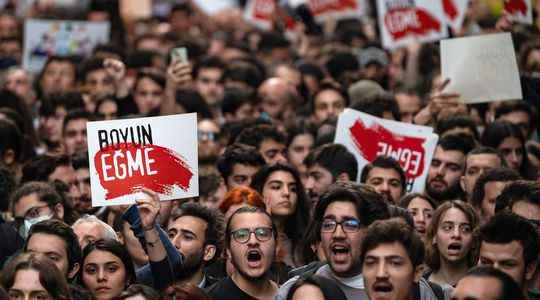They are few, this Tuesday, April 26, squeezed in a few narrow streets of the Taksim district, in the center of Istanbul. Slogans burst forth: “Taksim everywhere! Resistance everywhere!” ; “Don’t be silent, otherwise you’ll be next.” Rallying cries reminiscent of those of spring 2013, when they were tens, even hundreds of thousands gathered not far from there, on Taksim Square. At the time, a simple demonstration in favor of the safeguarding of the neighboring park of Gezi had led to the greatest wave of contestation which the power of Recep Tayyip Erdogan had to face. The revolt resulted in eight deaths.
Driven by a desire for revenge and to intimidate public opinion, the Turkish authorities have just sentenced eight civil society activists (lawyer, director, architect, etc.) to heavy prison terms, assigning them the hazy role “organizers” of these 2013 protests. Seven of the defendants were sentenced to eighteen years behind bars. The businessman and patron of the Turkish associative world, Osman Kavala, has an incompressible sentence of life imprisonment.
“It is we who are judged, our ideas, our way of life, we were all in the streets at the time of Gezi”, poses Canan Kaplan, a 37-year-old translator and musician. “It’s true that there are not many of us today, but those who came did so despite the fear of arrests and police violence,” said the young woman.
Justice under the orders of power
The context has evolved since 2013, with an authoritarian hardening of power and the end of the last doubts about the independence of justice. Three judges who acquitted Osman Kavala in 2020 have since been subject to disciplinary sanctions. And in the jury that found him guilty on Monday April 25, even though the indictment is empty and he has never been questioned by an investigating magistrate in four years of detention, there was a former judge candidate for the nomination for the 2018 parliamentary elections on a list of the AKP (Justice and Development Party), the party of President Erdogan.
On the evening of the verdict, the reis gave a reception for the meal of breaking the Ramadan fast, in his palace in Ankara, in honor of the magistracy. “In recent years, confidence in the judicial system has continued to grow,” welcomed the president in his speech.
A little apart from the demonstration, Boran, 17, is part of this “generation Z” (people born between 1997 and 2010) who have only known Erdogan in power. Depoliticized, disgusted and afraid of politics, this young Turkish generation is not present in the streets. “I find myself there by chance”, assures the young man, as if facing an interrogation. He nevertheless claims to disapprove of the convictions, while casting a worried look in the direction of the police force. What does he think of the future? “The future? We have no future, my brother,” he says half-laughing half-annoyed, before slipping away.
“Erdogan will beef up his game”
The future of this crowd and millions of other Turks will be decided next year, during the presidential election. The opposition has already put itself in battle order, by organizing a vast coalition of six parties, ranging from the conservatives to the Islamists, from the liberals to the hard right, passing through the social democrats. Everything except Erdogan. “If the opposition passes, this country will not turn into a paradise, but it will always be better, blows the musician Canan Kaplan. We can no longer suffocate under this economic misery, this widespread corruption and this authoritarianism.”
It remains to be seen how the ruling Islamo-nationalist coalition, which is currently only credited with 40% of the voting intentions, intends to approach these elections. “Erdogan is going to beef up his game, predicts political scientist Ismet Akça. Economically, he does not have the means to offer positive things, so he will try to divert the attention of public opinion from the economic crisis from which his base is suffering a lot, to further polarize society, and to attack opponents by all means.”
Surprisingly, the security forces who cordoned off the Taksim district left only one street open for the crowd to leave the place. She passes a small square where tables have been set up for the breaking of the Ramadan fast. Some guests are already seated. The looks in the direction of the colorful and vociferous crowd are taken aback, some frankly hostile, but no provocation takes place. The crowd joins the main Istiklal Avenue, where it finds itself drowned in the middle of onlookers and tourists, while the police arrest those who still allow themselves to chant slogans.
